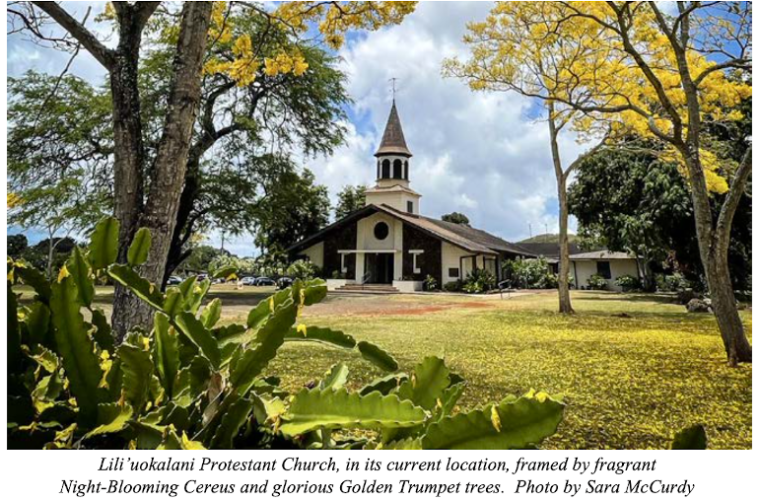The area that now surrounds the intersection of Hale’iwa Road and Kamehameha Highway has seen many changes over the years. The iconic Hale’iwa Hotel was built there in 1898. The Sea View Inn was built on the site in 1955, became the Chart House in 1990 and then Haleiwa Joe’s in 1998. But nearly two centuries ago, it was the location of Oahu’s second oldest Hawaiian Church built by a missionary couple whose beloved legacy is the Lili’uokalani Protes- tant Church in Haleiwa.
Between 1820 and 1863, twelve companies of missionaries were deployed to the Hawaiian Islands by the American Board of Commissioners for Foreign Mis- sions. The Reverend John Smith Emerson and his new bride Ursula Sophia Newell Emerson were part of the Fifth Company. After six months on a whal- ing ship that set sail from New Bedford, Massachu- setts, they arrived in Honolulu in May of 1832.

The Emersons were assigned to serve the 8,000 residents along Waialua’s thirty-mile coastline. High Chief Gideon Pele’ioholani La’anui, the Ko- nohiki of Waialua and one of the first Hawaiians to become literate in both English and his native language, helped them to establish a simple church near the Anahulu Stream’s outfall at Waialua Bay in July of 1832. The chartered name of the church
was Ka Ahahui Kahu Malama Waiwai O Ka Ekalesia O Kawailoa Ma Waialua, more often called the Ha- waiian Church in Waialua or simply the Waialua Church. By 1841, an adobe church with a high thatched roof was built in the area of the present-day church cemetery. The Emersons raised their eight children on property near the church. Son Nathan- iel Bright Emerson became Hawai’i’s first Harvard- trained medical doctor. John Smith Emerson died in 1867 at age 66. Ursula Emerson continued their ministry for another 21 years, passing away shortly before a third church was built of wood in 1890.
Lumber for the construction of the New England style church was donated by Queen Lili’uokalani. The Queen worshipped with the congregation when
she stayed in her home along the banks of Loko`ea Fishpond. She do- nated hymnals, cut-glass chandeliers and most notably, an enormous universal-calendar wall clock. Within a diameter of 32 inches, dials kept track of the days of the week, months of the year, number of weeks in the year, and phases of the moon. Only seven such clocks were manufactured in Connecticut in 1889, but there was one feature that made this one unique: the Queen replaced the numerals on the clock with the 12 letters of her name.
Construction on the fourth and present church began in 1960, de- signed by architect Theodore Alameda Vierra. Born on the Big Island to an Azorean born Portuguese father and Hawaiian-Scottish mother, Vierra was the first native Hawaiian admitted to the American Institute of Architecture. He was responsible for enlisting German-born Erica Karawina, a designer renowned for her stained-glass artwork, to create the windows for the new church. Karawina donated the Rose Window at the entry of the sanctuary designed as a memorial to church mem- bers who had contributed to the building fund but did not live to see it completed.
The new church was dedicated in June of 1961 and renamed by charter to the Lili’uokalani Protestant Church in 1975. Later renova- tions were completed in 1985 when a new weathervane in the form of an ‘iwa bird with a three-foot wingspan and a fish in its mouth was installed high atop the church steeple. The only one of its kind in the world, it evokes a passage from scripture “Follow me and I will make you fishers of men” (Matthew 4:19).
There are countless features unique to this exceptional church, but perhaps the most enduring are the contributions of the people who have devoted so much love and attention to the institution that is now 190 years strong. Established by Reverend John and Ursula Em- erson in 1832 with the support of Chief Gideon La`anui, and blessed by the patronage of Queen Lili’uokalani, the church is still thriving today due to a congregation intensely dedicated to the mission of the church. These loyal members “remain steadfast in the work of the Lord” on their way to the next anniversary of a cherished Hale’iwa landmark.




